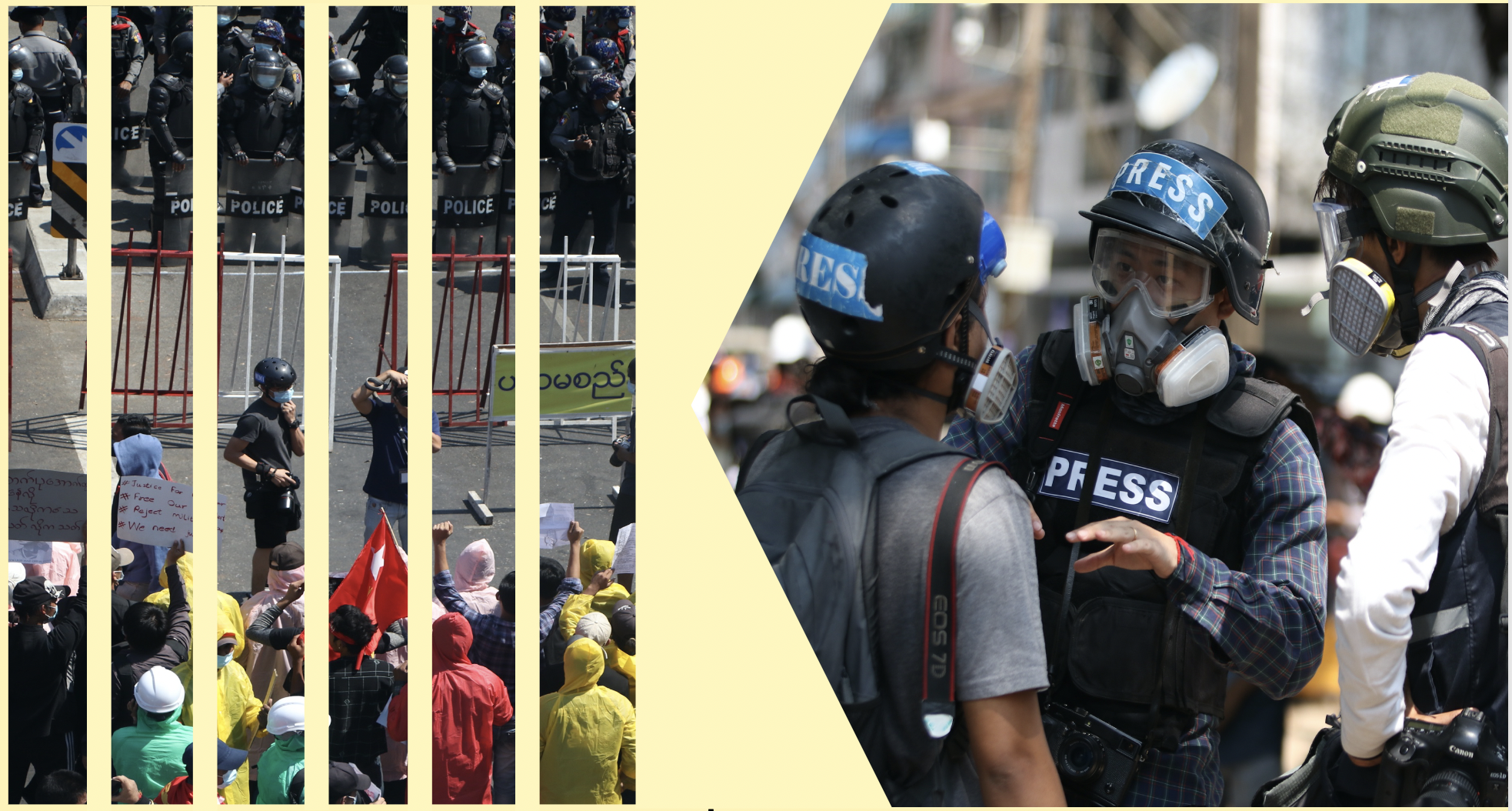Dictatorship Oppresses Media Freedom
Media freedom in Myanmar has fallen into the darkness since the day of the military coup on the 1st of February. The coup council has been oppressing media freedom which is one of the main pillars of democracy. There are four levels of violence by the coup council in violation of media freedom.
In the first phase, the coup council has started restricting information and usage of terms by media. On the 2nd of February, the next day of the coup, the Ministry of Information of the coup council issued Order No.1/2021 in which describes “not to do in publishing rumors on social media, inciting unrest, releasing statements to incite unrest, and media should cooperate with the government by existing laws”. The freedom of the press was initially deterred by deceiving them as “rumors, publishing statements to cause unrest and turmoil.”The Ministry of Information has instructed the Myanmar News Media Council not to use the term “coup d’état” in the coverage of media and to take action in accordance with the Media Code of Conduct. It was the beginning of the oppression of media freedom.
In the second phase, the freedom of media was verbally threatened beyond the written word. At the first conference of the Ministry of Information, Deputy Minister Maj-Gen Zaw Min Tun said that it was not possible to say for sure whether they would guarantee the safety of journalists or not, and if the journalists used the term of coup d’état, it would take action to ban the publication of media. Then, the coup council announced the termination of 23 members of the Myanmar News Media Council on March 4. In fact, 24 out of 26 members of the Media Council already resigned voluntarily on February 18; saying that “it was uncertain to protect freedom of media and journalists anymore.” As a result, Media Council in which can assist media freedom dissolved, as well.
In the third phase, mass arrest and targeted arrest of journalists as well as dismissals were done. After a week of the military coup, on February 9, Ba Gyi Aung who was a Mandalay-based DVB correspondent, was arrested along with protesters while he was documenting news. He was released from a detained police car owing to the request of other journalists and media. Later, in an event of use of force on a crowd by police in Myitkyina, Kachin state, five journalists who were documenting news were arrested on February 14. Those journalists were Sai Aung Latt from Mizzima, Ko Htwal Aung and Ko Naw Sai from the 74 Media, and Ko Yan Kaung and Ko Wai Yan from Eternal Peace News Network (EPN). Initially, journalists were arrested along with protesters and then targeted arrest has begun two weeks later. At this stage, journalists were being arrested while they were on the ground such as taking news on protests, court hearings, and working as a reporter. Moreover, as the crackdown on protesters escalated, also journalists covering protests were beaten and shot with bow stones. In mid of March, nineteen employees of Mandalay Daily published by the Mandalay City Development Committee were fired for their involvement in the civil disobedience movement (CDM).
In the fourth phase, the coup council has been engaging in more violent action to put the media in absolute darkness. On March 8, the Ministry of Information by the coup council banned the publishing licenses of independent media outlets; naming DVB, Mizzima, Khit Thit Media, Myanmar Now and 7 Days News Agency and broadcasting or publishing news using any kinds of media and technology from those media is prohibited. Free-to-air TV channels of DVB and Mizzima have been cut off since February 1. After that, the coup council has also banned publishing licenses of regional media such as Tachileik News Agency, Myitkyina News Agency, and the 74 Media. In addition to banning media publication, armed groups of the coup council raided some media houses including Mizzima,Myanmar Now,Kamaryut media, and the Hakha Post carried out office documents and equipment. Then again, the coup council ordered to remove PSI satellite dishes in various parts of the country as an effort to cut off public information.
In second week of March, not only there were arrests of journalist who were working on ground but there were also arrests of them by shooting at their houses. In the worst-case scenario, if the journalist was not found, his/her family members, relatives and husband or wife were also arrested. There were cases of arresting brother-in-law while Salai Bwe Oak Htan, an editor in chief of the Chinland Post, was not found by the army in search of his house, and arresting of her husband,Ko Ye Ko Ko, when Ma Thuzar, a freelance journalist, was not found in raiding of her house where in staff housing of Dagon University, East Yangon township, by police.
Among the journalists arrested by the coup council, there were two foreign journalists and a foreign editor apart from Burmese journalists. Robert Bociaga, a Polish journalist who was reporting news in Taunggyi, and Yuki Kitazumi, a Japanese journalist who was reporting news in Yangon, were also arrested, and then deported to their home countries by negotiation of two embassies. Danny Fenster, an American and editor of Frontier Myanmar magazine, was arrested at Yangon airport on May 25 and charged under Section 505 (A) of Penal Code.
Arrested journalists have been charged under Section 505 (A) of Penal code, Section 505 (B) of Penal code,Section 505 (C) of Penal code,Section 188 for disobedience and including Section for violating curfew. Journalists have been issued warrant under Section 505 (A) and Section 66 (d) of the Telecommunications Law although they have not been arrested yet. Among the arrested and charged journalists, Ko Min Nyo, Pyay-based DVB reporter charged under Section 505 (A), was sentenced to three years in prison during his trial at the military court on May 12, Ko Aung Kyaw, a DVB journalist, and Ko Zaw Zaw, a freelance reporter of Mizzima, were sentenced to two years in prison on June 2, and Ko Thet Naing Win, a freelance journalist from Bago, was sentenced to three years in prison on June 16, respectively.
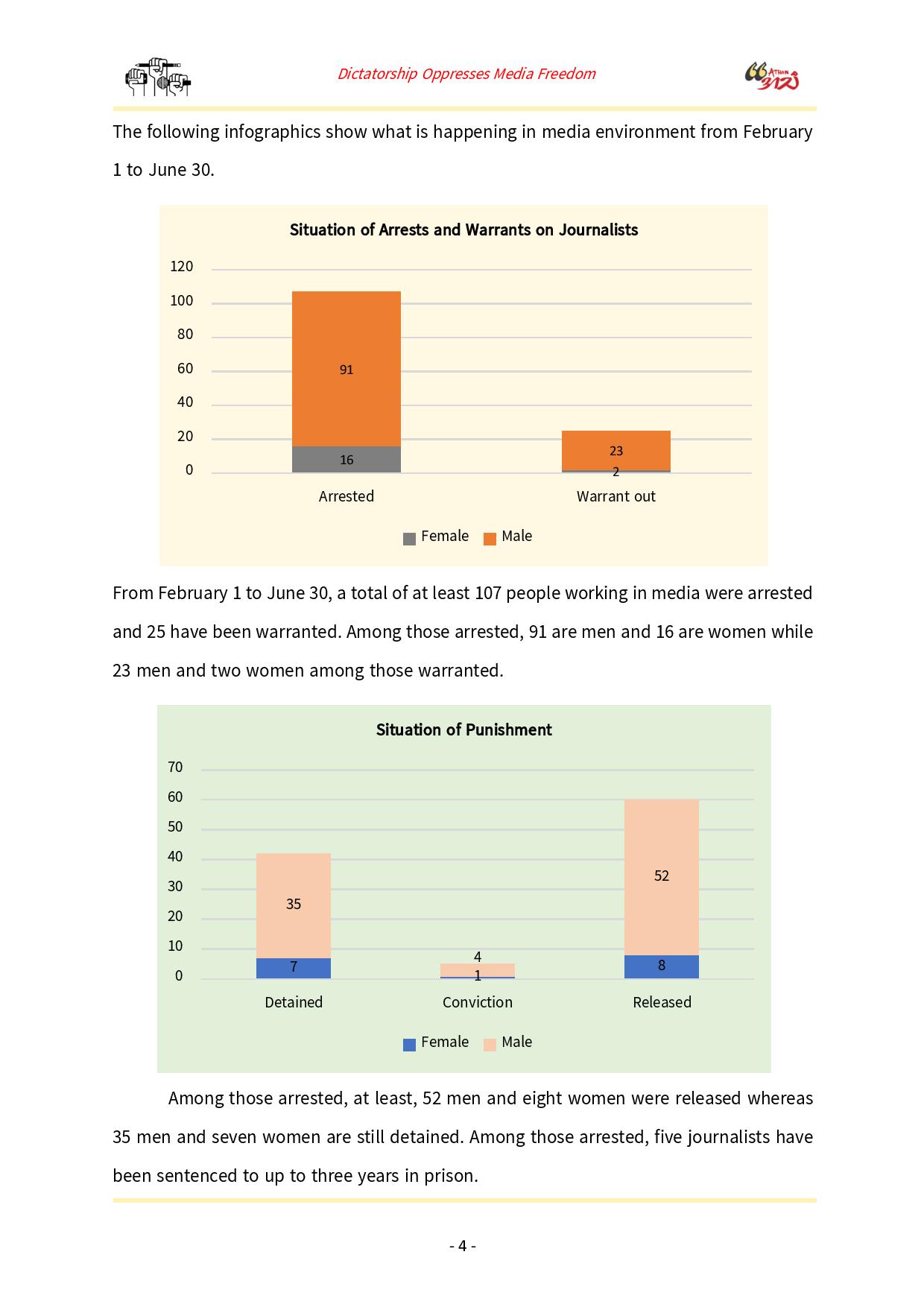
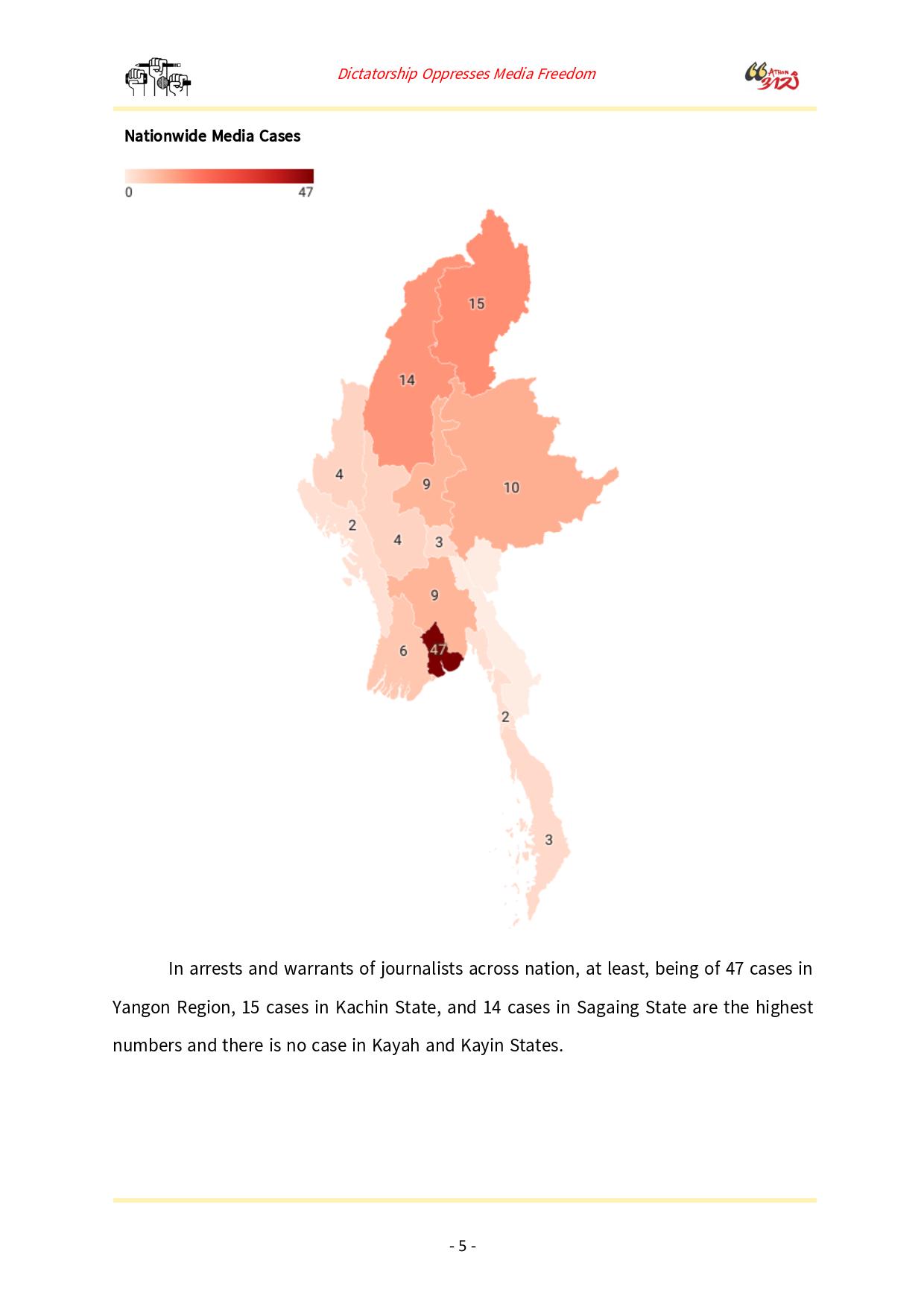
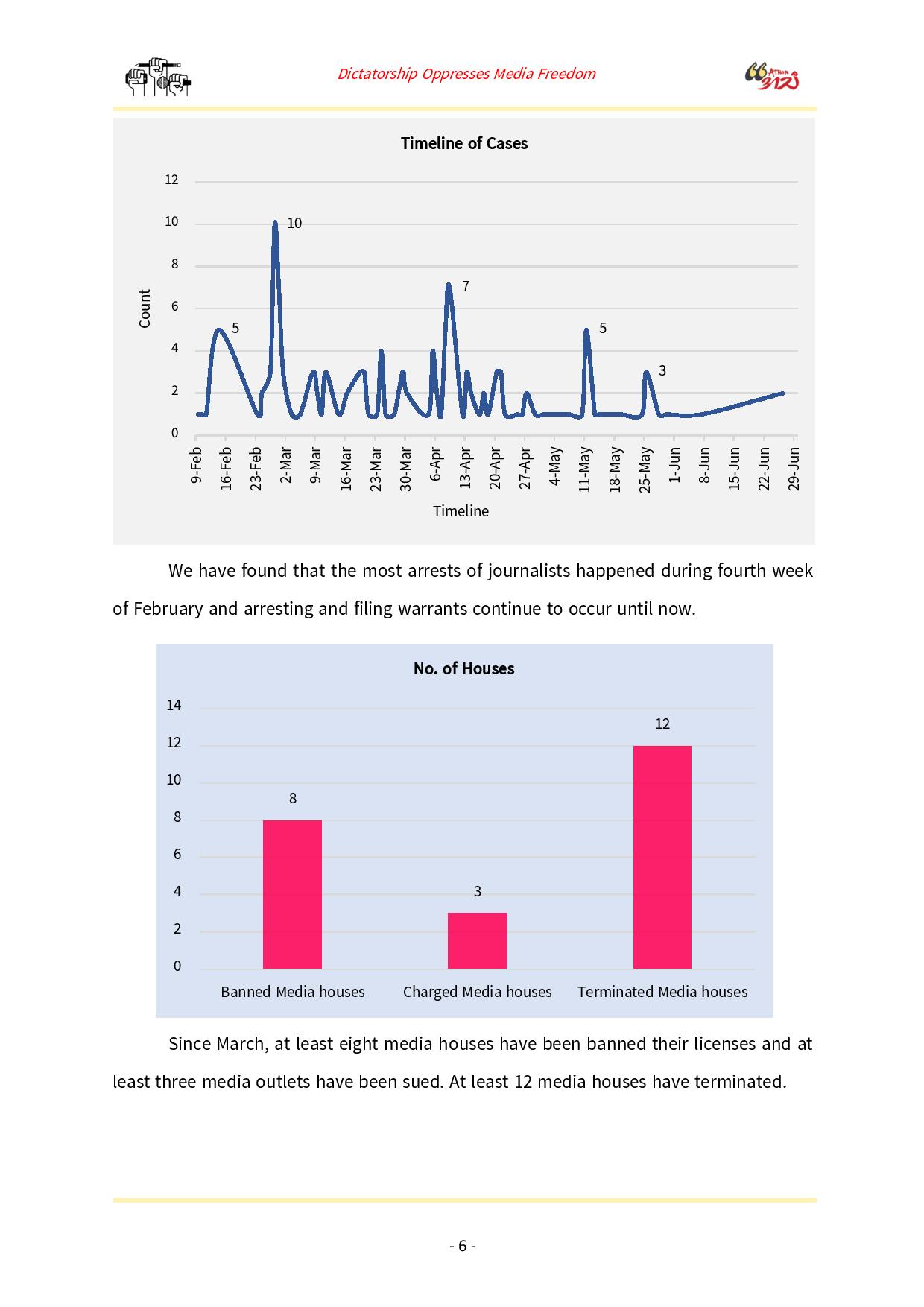
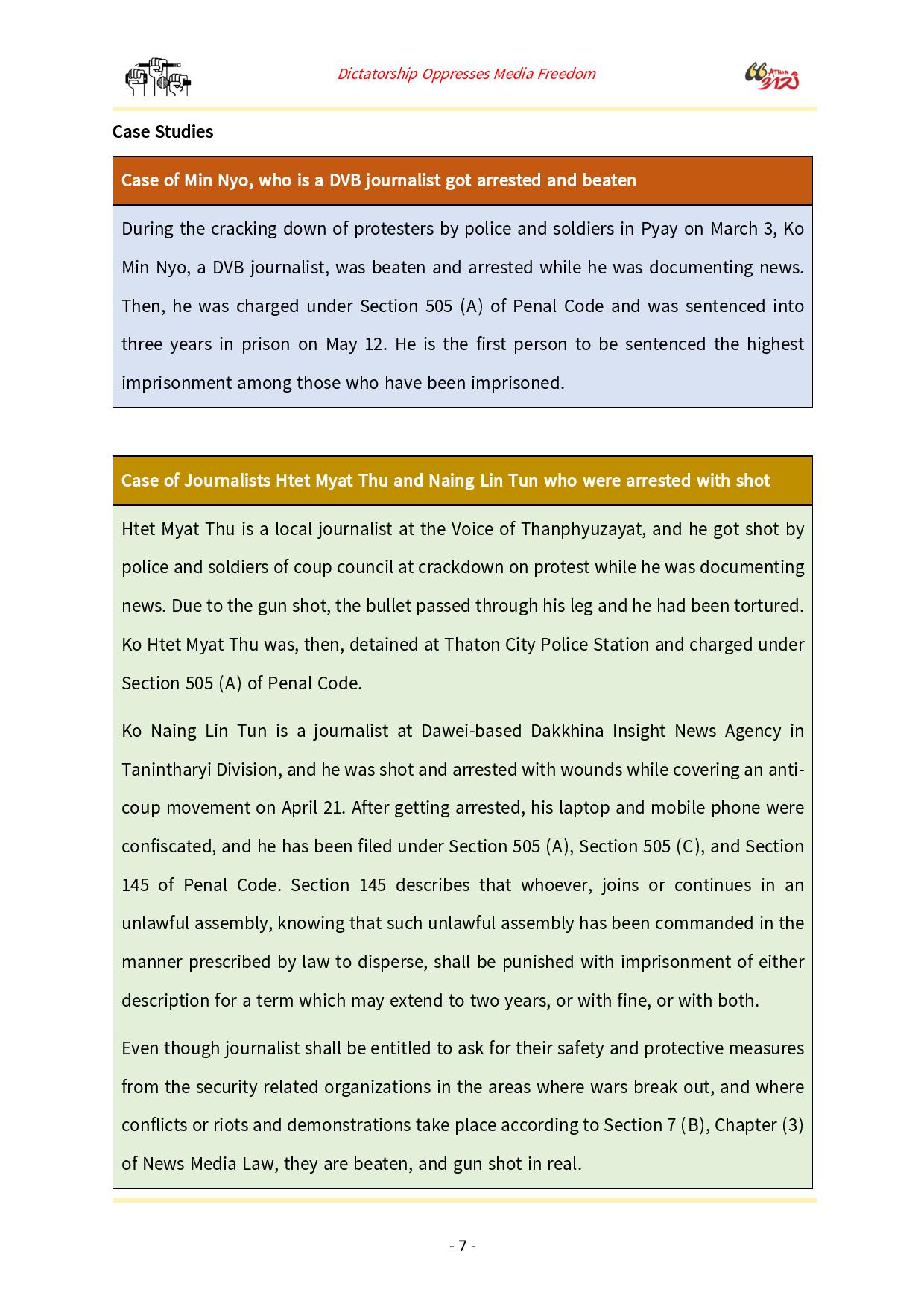
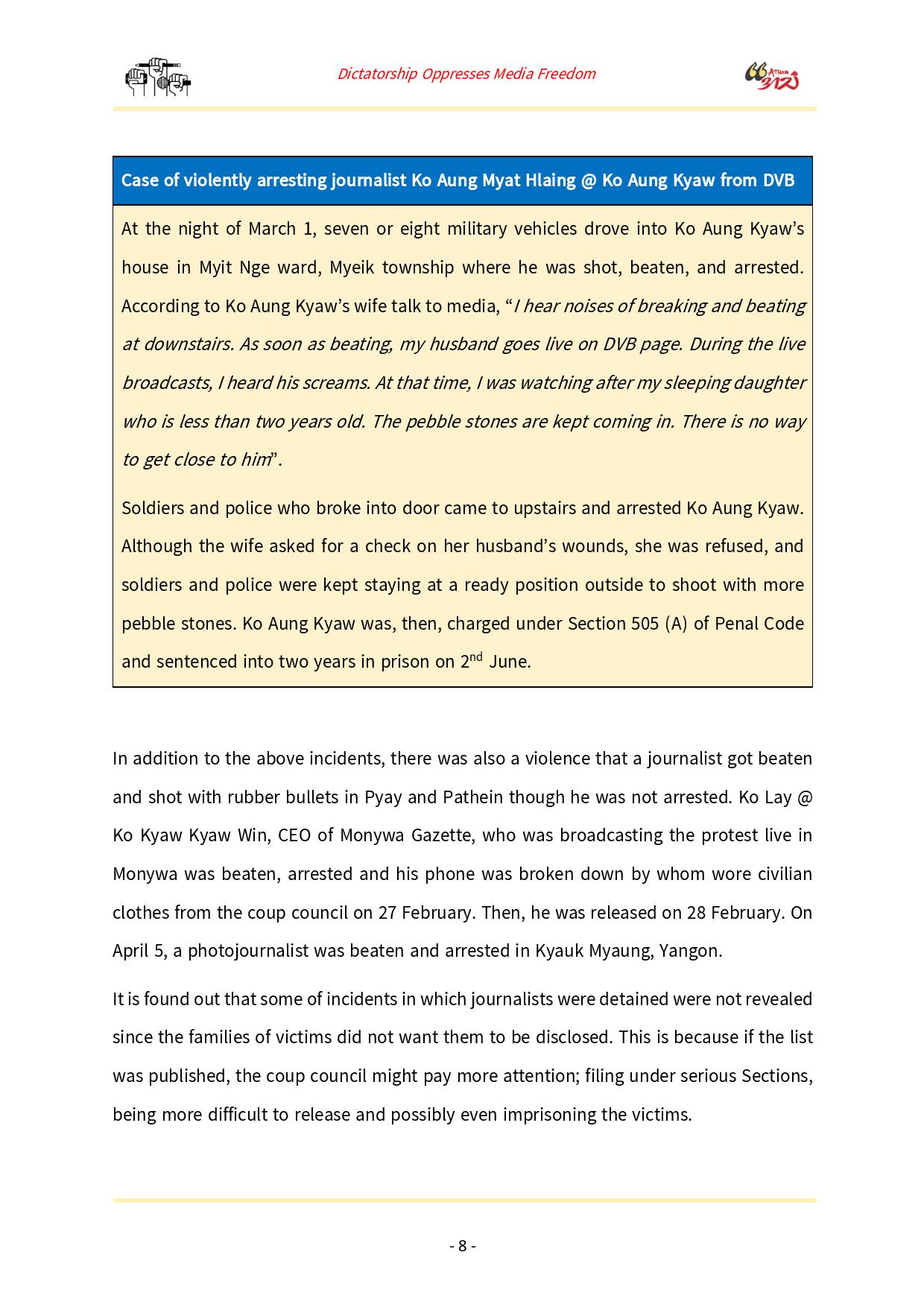
As a result, media freedom in Myanmar has been severely oppressed since the military coup, with journalists being violently arrested and imprisoned at its worst. These lists and contents are based on accessible information only and are likely to be more in numbers and worse in the ground context, nationally.
Research Methodology
In conducting this research report, data and cases are based on daily monitoring of online media, taking interviews, and confirming with some trusted individuals who are working in the media environment. An inductive reasoning is used to analyze the research. The research team has conducted many times of meeting and discussions for this report.

